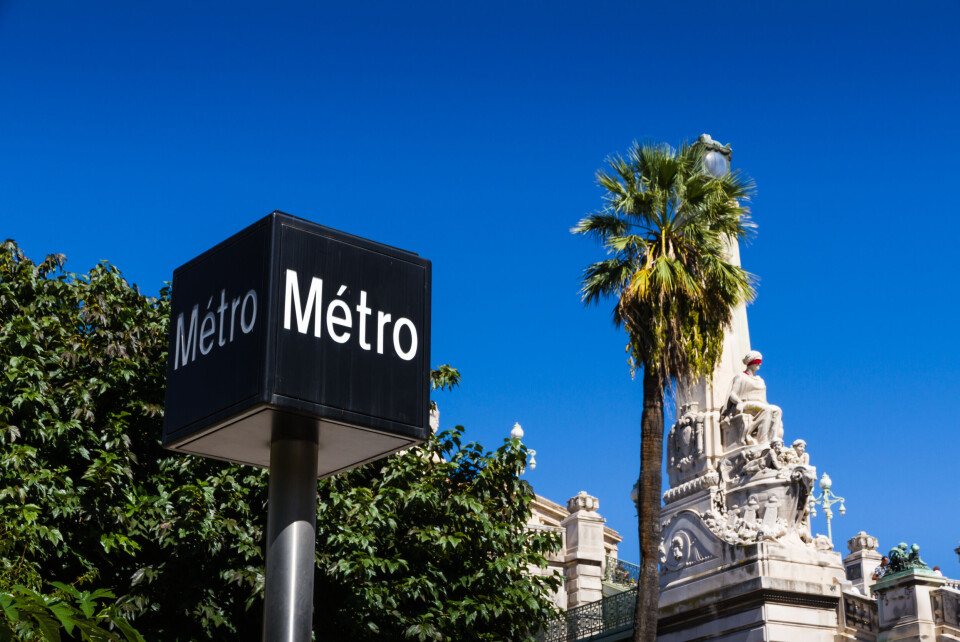-
Anti-mosquito activity already in France amid ‘exceptional’ weather
Wet and warm conditions are encouraging some species to emerge early
-
Frequent ‘roaming animal’ warning near Toulouse ring road amuses drivers
‘Faster than the traffic’ or ‘competing in the Olympic biathlon’ among humorous online comments
-
Two further skier deaths confirmed after weekend avalanches in French Alps
Experienced ski tourers were found when avalanche transceivers emitted warning
Marseille’s metro to start making announcements in Provençal
Will it help spark a wider revival of the dialect?

Recorded announcements on Marseille’s metro will soon be expanded to include the local Provençal dialect, The Connexion has learned.
Although no start date has been confirmed, transport authorities have hinted it will be in place in time for the Rugby World Cup in September.
“At the dawn of the Rugby World Cup, visitors from all over the world, as well as the people of Marseille, will be able to appreciate this nod to the history, culture and traditions of this beautiful Provence that we love so much,” said Catherine Pila, president of the southern French city’s transport authority Régie des transports Métropolitains (RTM)
Ms Pila, in a statement sent to The Connexion, said station announcements on Marseille’s metro would be made in Provençal.
It is part of plans to make each metro station “into a cultural exhibition centre”.
She added the authority wanted “each of the 320,000 Marseillais who take the metro every day to find a work of art while travelling [including] sculpture, paintings, drawings, and engravings”.
What is Provençal?
Provençal is a form of patois - or local dialect - stemming from the Occitan language, which is still spoken in the south of France as well as the north of Spain and Italy.
Occitan was long the main language spoken in southern France and had its golden age between the 11th and 13th centuries.
However in 1539, King François I signed into law an edict that made French the official language of law and administration, instead of Latin and the other languages of the country.
Yet, by 1863, more than half the population in the south of France remained non-French speaking, according to Graham Robb’s The Discovery of France.
The French government, at the turn of the 20th century, made attempts to restrict the use and teaching of many minority languages, including Occitan, in public schools.
However these days the government supports regional dialects and in recent decades Provençal has enjoyed a small but important revival.
‘We’re very happy’
Jean-Pierre Richard, president of Collectif Prouvènço, a regional association that promotes the language and culture of Provence gave his reaction to the news from Marseille.
“We’re very happy with [the move to have announcements in Provençal],” he told The Connexion.
“At Collectif Prouvènço, we organise Provençal cafes, where people can come and chat in Provençal. The simple fact of hearing Provençal helps a lot with learning the language, which is why we’re so glad that people in Marseille will get to hear Provençal on their daily commute.”
He also explained that there are “actually three different dialects: Provençal, Provençal Alpin, and Niçois” and there are several ways to learn.
This includes optional classes, which are sometimes offered as early as pre-school, but also in middle and high school.
He said learning Provençal can be a great way to help children and adults learn other Latin languages.
“Learning Provençal is a gateway to learning Spanish, Portuguese, and Italian,” he added.
“Our friends in Northern Europe can easily switch between three or four languages, and I like to think that we’re not any dumber than they are,” he joked. “We can all be linguistic acrobats.”
He said that people in France are sometimes “known for struggling to learn languages in the first place” and that “there is a sort of French arrogance” due to French being a language with worldwide prestige.
Related articles
The man behind the French film classic ‘Jean de Florette’
























